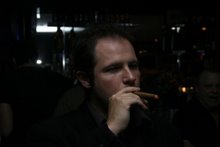We see it all the time, so often, in fact that we hardly notice it. I suppose, in the grand scheme of media ethics, it's no big crime. Television news providers using the physical location of a reporter to convey a sense of authority, even if none exists.
A good example, if there is a ten car pile up on the interstate during morning rush hour, odds are, at least one of the local stations will have an ENG crew on the side of the road when the nightly news airs at eleven pm.
The report normally begins with the words, "I'm (name of reporter) here at the site of a deadly accident that happened earlier today on (name of highway)."
Which is all great except for the fact that it happened fifteen hours ago. The wounded have been taken to the hospital. The roadside investigation is complete. The vehicles have been hauled away and the emergency services have all packed up and left. There's nothing there to see. There is no journalistic reason to have that person deliver their story from the side of the road rather than have the anchor read the copy in the studio. That person is standing on the side of the highway simply to underscore a false pretense of immediacy and authority, to make you think that they and their station are more on the ball than they would otherwise seem. After all, what good is it to have a reporter say, "I'm here on the side of the highway where absolutely nothing is happening."
This isn't just a local phenomenon. Several times I've seen CNN, when reporting some issue in Atlanta, have a correspondent standing in Centennial Olympic Park. They never seem to address the fact that metro Atlanta is nearly seventy miles across and that Centennial park is, likely, nowhere near what it is they are reporting.
Do you know what Centennial park is very close to? It's across the street from CNN headquarters. A reporter and a camera person strolled out of the CNN studio, across the food court and walked across Marietta Street. They make very sure to face north so that the Atlantic Plaza, formerly the IBM building, Nation's Bank Tower and the Westin Peachtree, all iconic Atlanta skyscrapers, are clearly visible. Were they to face south, of course, you would see the giant CNN logo on the front of the building they just left. Daryn Kagan, or any one of the Atlanta based anchors will then chat with the correspondent who is "live in Atlanta" without mentioning that that correspondent is less than two hundred yards away.
I'm not suggesting any sort of malfeasance on the part of CNN. They're not lying. That reporter is, in fact, in Atlanta and they're probably well informed on the issues and well qualified to bring that information to the public. All they're doing is playing with the set dressing a bit so that their news might seem a touch more appealing, a bit more legitimate, than a rival's. This is the logical outgrowth of the marketplace of media.
It is something we need to watch for, though. These subtle manipulations, while mostly harmless, have a cumulative effect on our credulity, our skepticism and on the ways that we unknowingly make decisions about media-ized data.
Point being, pay attention to the set dressing, understand how the questions are being asked, think about the bits of interviews that don't make the final piece, contemplate the audience that each news program is geared towards. Moreover, write to the news provider to which you ascribe the most authenticity, no matter what organization that is. Make them know that they are accountable to you and that you are wise to the tricks they use when selling your eyes to advertisers.
This is essential to keeping the accounters accountable.
Subscribe to:
Post Comments (Atom)


3 comments:
Daryn Kagan left CNN last year after a 12-year run with the network. Check out this recent profile of her from Friday's "New Orleans Times Picayune" Living section:
http://www.nola.com/timespic/stories/index.ssf?/base/living-8/118793561953280.xml&coll=1
I have seen EXACTLY what you are describing and it even happens inside as well. We have a "head shot" room where I work and CNN and the like are free to book it for a guest to speak on one of their news panel shows. The ones where there the screen is split into 4 images of people screaming at each other.
We have the room and and dress it up any way we want and throw down even a few papers on a desk and zoom out a little bit so people think that the guest is hard at work investigating the topic at hand. Most of the time the camera is close enough that you can't see what the person is doing, it's from the shoulders up. but we could throw up a background if we want of a city skyline. News isn't really news anymore it's like this cross between entertainment and tabloid TV.
I never thought deeply about this before, but you are absolutely right. I live in Philadelphia, and the reporters frequently broadcast from the site of an accident or suicide long after it has happened.
Post a Comment